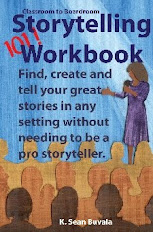Nonetheless- do you have a moment? Oh, very good.
Welcome to the show. And what a show it is. Storytelling is the mother of all art forms. An idea forms from the substance around us. That form then becomes narrative. That narrative becomes story. People share those narratives together and the story becomes storytelling. That storytelling inspires artists of all types.
Since you have walked into the Oral-Storytelling tent with the rest of us, let me welcome you inside with a few tips.
1. Use a microphone. If we can't hear you, your story has no value to us. Sitting with friends and entertaining them with your story is one thing but if you are going to stand up and speak to all of us: we need to hear you, no matter how confident or pumped you think you are.
2. Stay focused on the story. Some people will tell you that a storyteller is supposed to just be a vessel for the story, but that's pretty much metaphorical talk that is far away from where you are now in the art form. But here's a problem: that cool thing you do with the broad acrobatics and grunting (or guitaring or balancing plates on your head…whatever) isn't helping with the story. If at the end of an experience of oral storytelling we're talking more about your antics than the story you told, then something went wrong with your storytelling.
Let me clarify that I am not in the be-still-all-times storytelling camp. Your intentional movements that keep the story clear are just fine. Keep first in your mind your story and the connection it creates to and with your audience. Be ringmaster not roustabout.
3. Learn your story in parts. I see new storytellers try to recite stories they have memorized. They get lost and confused. So, do storytelling instead. See the story. Break it into parts. Tell us the parts you see rather than the words you have stored. Cool phrases and "crafting" (you are going to hear that word a lot) of the story will come later as you internalize the story. For now, go unplugged-style and just tell us the story you are seeing.
4. Get coached. If you are going to be serious in any art form, you need to take some classes and get some input. Tell me, how many sports stars are self-taught? None of course. You can be sure that every other artist in this tent (regardless of their skill level) has voices they seek out for guidance. If you are telling jokes in the bar (not storytelling anyway), then you can go it alone. If you want to communicate, you need training and coaching.
So, I am glad you are here. We need new voices and new understandings of our very specific art form. Come grow with us who have been at this for a while. I love it when I get to say, "I learned something from this new voice today." That is so cool.
******
The is the official blog for K. Sean Buvala, storyteller and storytelling coach.




